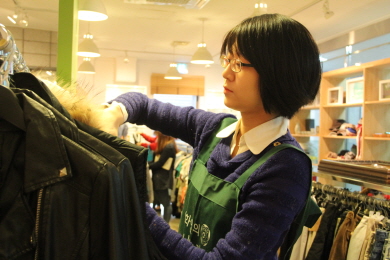
It signifies that she is fully devoted to the Ewha COOP and knows a lot about how Ewha students look from the perspective of a manager of the shops on campus.
In that sense, Kim Hye-ri, a junior majoring in psychology, unfolds the scenes behind the shops in the Ewha COOP.
Comprised of 50 Ewha students, “Dongdong-i” supervises the operation of 19 Ewha Womans University Cooperative (Ewha COOP) stores in campus buildings.
“Many people believe that our tasks are limited to cleanig the shop, taking orders and making drinks,” Kim said. “However, we do more than that. We also display products in souvenir shops and make sure that all products are properly stocked from supplying companies.”
Kim recalled a moment when she first worked as a dongdong-i at a bakery in the Student Union Building. She got an order wrong and accidently dropped a glass of ginger tea, making a huge mess.
“Frustrated, I thought ‘I will be dead pretty soon.’ An image of getting severely reprimanded instantly crossed my mind,” Kim said. “However, the chief manager did not say anything. In retrospect, I guess that is how dongdong-is get to learn how to work well, through trial and error.”
Now, Kim is working in the Ewha Eco Shop for the spring semester, which was officially incorporated into Ewha COOP this March.
Not long after she started working there, Kim discovered that a considerable number of foreign students often visit the Ewha Eco Shop, although the shop is not easily seen from the outside.
“I never expected foreign students to visit the Ewha Eco Shop,” Kim said. “It was also interesting to notice the fact that foreign students usually buy about four to five things at once, while Korean students are very careful when choosing a single product.”
Kim admits to often being bewildered when she gets a lot of questions from foreign students about the products.
“When asked, I have no choice but to use simple English words with body language to answer their numerous questions,” Kim said.
As an experienced dongdong-i, Kim encourages more people to ask dongdong-is for help.
“I hope that more people will readily come to us and ask for help,” Kim said. “Some people think that we fee1 annoyed by their questions if we are working on other things. However, for us, there is no reason to hesitate.”
Park Kyoung-eun
kathypark226@ewhain.net

